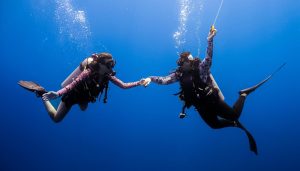Busting 10 common scuba diving myths
Scuba was invented less than 80 years ago and for the longest time it was accessible only to a very small section of society. It is only in the last thirty years that scuba diving has jumped to popularity because it became easier to learn. No wonder so many people are still confused as to what it is and how it is done. Here is a list of the most common concerns and misconceptions that people bring to us before their first dive and the truth behind them.
#1. I can’t dive because I can’t swim
NOT TRUE– You can definitely do an introductory dive even if you don’t know how to swim. You do need swimming skills for a diving certification but there are a wide range of first-timer programs that are specially designed for non swimmers. In these programs you will be accompanied by an experienced dive instructor who will swim for you if needed.
#2. I’m too old to dive
NOT TRUE– Diving can be done by anyone 10 years and above but there is really no proper upper age limit for it. We have had 80 year olds come to do their Open Water course, fun dive and also Discover Scuba Dive with us. This is commonly thought because older people are more likely to not clear the medical requirements for diving, but if they do clear them and are physically fit, there is nothing to stop them from diving. We’ll tell you a little secret, all the oldies who come to dive are as excited as children and always more excited than middle age adults on a scuba dive.
#3. Scuba Diving looks too hard and is too extreme for me
NOT TRUE– Scuba diving has been made so easy that even a 10 year old can do it. Yes, it is an adventure sport and all that complicated gear can look intimidating, but it is really not that hard. For first timers, once you’re underwater all you need to really do, is to breathe and equalize while enjoying the wonderful world of fish.
#4. Diving will make my ears hurt
NOT TRUE– Diving could have hurt your ears if you didn’t learn to equalize pressure in them properly. The pressure increases as you go deeper underwater because water is heavier than air. The pressure on your ear feels very similar to how your ears get blocked on a flight and can be easily managed by the simple technique of equalizing by pinching your nose and blowing against it or wiggling your jaw. It is the most important skill needed to be able to dive and is usually one of the first to be taught.
#5. I had a bad experience with diving in the past and can’t do it again
NOT TRUE– It is possible that you were just unfortunate to have a trainer that was maybe inexperienced or didn’t care as much. For this reason it is important to not compromise while choosing a reliable dive operator, as that could make all the difference to your dive experience. If you’re sure that any ear pain and discomfort on a previous dive attempt was not due to a medical condition, you should definitely try again with a better dive operator.
#6. We can’t dive when it rains
NOT TRUE- Scuba diving can be done all year round in the tropical Andaman Islands. The dive shop does receive fewer divers during the Indian monsoon because no one wants to go to a beach when it’s raining, but it is never really closed. Mild weather events on the surface do not affect the conditions underwater. It is only when the winds pick up and there are storm like conditions that we might decide to cancel diving. One of the most beautiful sights while diving in the rain is watching rain drops pitter-pattering on the surface from underwater.
#7. The oxygen in my tank will get over
NOT TRUE- Here we get to bust two myths with one stone. Firstly, your tank is not filled with oxygen but with compressed air (just like what you’re breathing now), which is a 21 per cent oxygen and 79 per cent nitrogen mixture. Secondly a full 12lt tank contains 2400 litres of compressed air! That can last one beginner diver between 1-3 hours depending on their lung capacity. While certified divers are taught to monitor their own air, an experienced dive instructor will also be constantly monitoring air for a novice. So you don’t have to worry about the air in your scuba tank running out.
#9.The fish will bite me
NOT TRUE- None of the aquatic life underwater wants anything to do with you. Before you get scared of them try to think about how much bigger you are and how that’s more reason for them to actually be scared of you. If you think about it, you’re might be worried about them biting you but they are actually worried about you eating them. Jokes aside, we do make it a point to observe them in a respectful manner and from a distance so as to not scare or harass them. You must remember that you are a guest in their home not the other way round.
#10. A shark will eat me
NOT TRUE- Sharks don’t eat people! And yes, Jaws was a lie! Firstly they truly think we taste yucky and never has a shark been known to eat a human. There are about 500 species of sharks and only maybe 4-5 of them have been known to be occasionally aggressive, none of whom you find in Havelock. For us divers’, spotting a shark is actually very exciting as most sharks we encounter are actually docile and extremely shy. The handful of shark attacks does not even compare to the 100 million sharks killed by humans each year. More people die in road accidents than because of sharks.





